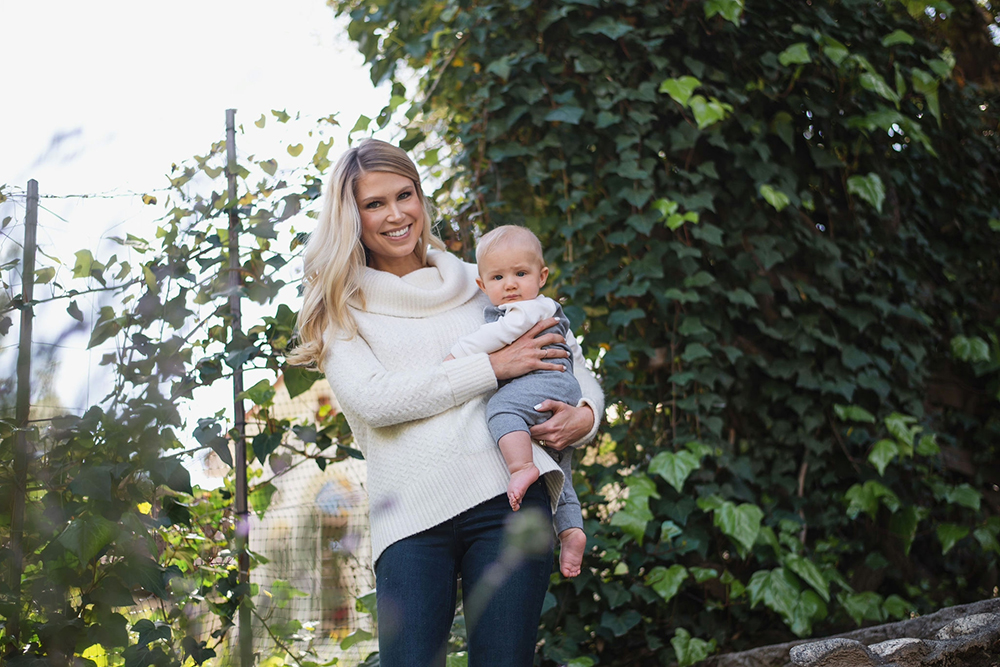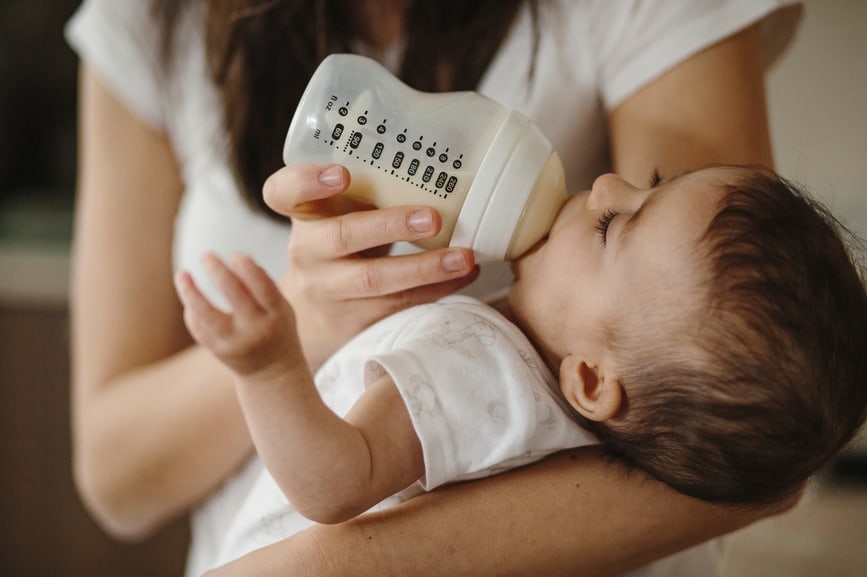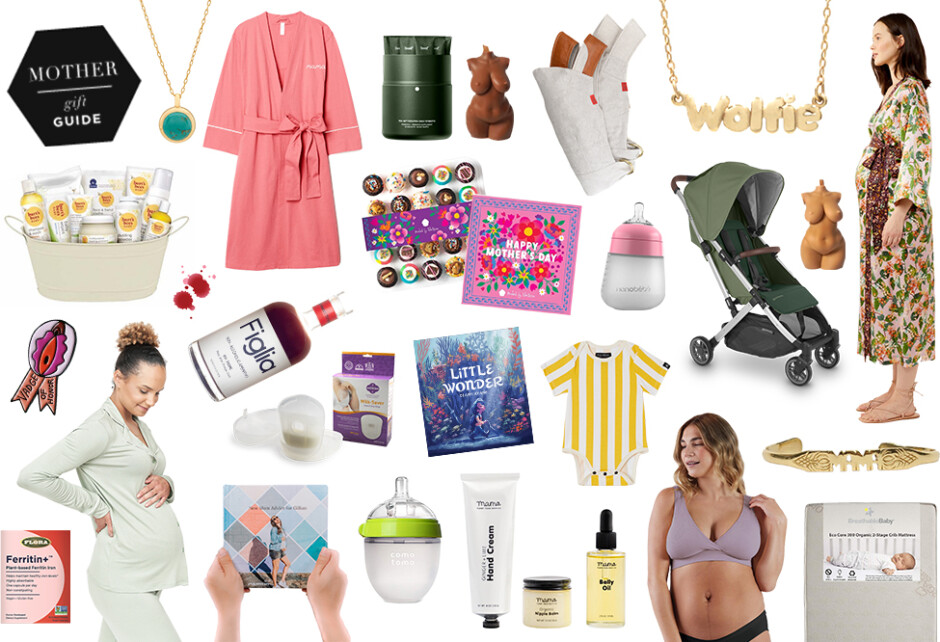
Mom Talk: How I Battled Post-Weaning Depression
Written by Maggie Jackson
Photography by Photo courtesy of Maggie Jackson
Thankfully, awareness and coverage of postpartum depression is on the rise. As is prenatal anxiety and many other postpartum mood disorders. One ailment we have not heard about, however, is post-weaning depression. And that’s where today’s Mom Talk comes in. Texas-raised, SoCal-based based writer, PR specialist, and mother of two Maggie Jackson opens up a dialogue around the issue by sharing her personal story below.
I stared blankly at my computer screen while sitting at the table in our dark dining room. I glanced out the window and saw a beautiful sorbet sky, typical of early winter sunsets in Southern California.
“Wow,” I thought. “My child is looking at this gorgeous sky right now with someone else that’s not me.”
I sighed, turned back to my computer screen and saw several unopened emails that needed attending. Instead, I Googled “how to balance work and motherhood.”
If you haven’t already guessed, yes, I was in a dark place. My son had recently turned 1 years old, and I was really struggling with how to be a mom that I felt good about. I felt I was failing, and I felt my role as mom in my son’s life was on a downward spiral that I couldn’t get out of.
From the outside, I’m sure my life seemed perfect. I purposely set myself up to “have it all”—both a career and motherhood. Before having babies, I started my own company with the intention to have the flexibility to work from home and see my children. But, as my company grew more successful, the more I hired outside childcare and the less time I spent with my baby. Still, I got to work from home, make my own schedule, and do dinner, bath, and bedtime every night with my son. I was still exclusively breastfeeding when he turned 1. From what we’re taught on how to be a “good mom,” I was making every effort to do it all and it appeared as though I was succeeding. So, I should be grateful, right?
Soon after my son’s first birthday, I had to go on an overnight work trip thousands of miles away from my family. I was excited. It was a great opportunity for me and my company. But, I was also extremely nervous. I’d never been away overnight without my baby. We were still exclusively breastfeeding, and he loved it. In fact, he loved it so much that he never took a bottle. We had tried all brands and types of bottles and nipple flows when he was an infant, and he refused for months. We eventually gave up trying with bottles, and I accepted that we’d just be very close for that first year.
I have to admit, I loved exclusively breastfeeding, too. I loved how it calmed him down. It calmed me down, too. I loved that it was a part of our routine and how we snuggled every night before bed. It was the only thing I could give my son that no one else could. It was how we were still connected even though he was no longer inside my womb.
In preparation for the work trip, we started weaning a month before, so he wouldn’t need me while I was gone. But, in that time, we went on a family vacation that really threw my son off his normal routine. He has a very sensitive personality and doesn’t like too much change, so he felt the need to breastfeed even more than he had in the last several months. It was his way to feel safe, and I couldn’t deny him of that security.
I left for that work trip with a mind full of anxiety and boobs full of milk. My supply had increased while my son picked up his nursing on vacation. My husband and nanny assured me that they’d take care of my son and he’d be fine. There was nothing left for me to do but go.
Despite having some breast pain from weaning too fast, I had a wonderful time on the work trip. It was the first time I had 48 hours alone to myself in over a year. I had adult dinners and conversations that didn’t involve nap routines, diaper bags, and baby toys. I started to accept that this was the next step in my relationship with my son, and it wouldn’t be so bad.
My son did well at home, too. He fell asleep without nursing and with little fuss. My husband reported to me that he slept through the night and woke up happy. “Wow, what a relief,” I thought.
When I returned home, our nursing journey had officially come to an end. That first night back home, I let him take the lead at bedtime. We did our normal routine, but he no longer crooned his neck toward my bosom after story time. I sang him a lullaby, placed him in his crib and left his room. I almost collapsed in sadness as I shut the door, but I straightened up and continued on with my own usual evening routine. “This is just the normal next step,” I assured myself. “It was going to come to an end sometime, anyway.”
We quickly adjusted to our new normal and continued life as usual. But, as I went about my normal work days, I often couldn’t help but feel that something was missing. I longed for more time with my son. I felt like I hardly knew him anymore. I was missing the connection with my baby. It was as if he had suddenly left me overnight, and I was grieving as if I had lost something that I could never get back.
The mornings started feeling gray. I’d wake up with a cloud lingering over my head. Our nanny would come take our son to the children’s museum, music classes, and story time at the library, and I would sit at my computer so resentful toward the work that caused time away from my baby—work that I used to love.
I started resenting our nanny, too. She spent too much time with him, never cared for him the way I would prefer to do it, and was spoiling him. I made up so many reasons to start disliking the woman we had trusted to care for our child for the last year.
The sadness made me feel lethargic, so I stopped exercising as much. I was eager to feel better on the inside, so I started indulging in more wine and chocolate, which was a nice temporary bit of happiness, but, ultimately, just made me feel worse.
One afternoon, I was staring at all the work emails that laid before me on my computer screen, and I couldn’t finish answering them. It dawned on me that this was becoming a new normal for me. I felt overwhelmed, like I was failing at my work and failing at being a mom. I was in a funk. A dark funk.
Being from a family with a history of mental illness, I knew that this darkness shouldn’t be ignored. But, what was causing this sadness? When did it start, and why?
I started thinking back on the last couple of months and really assessing how I was feeling about all areas of my life and what could be wrong. I thought that no way could I be suffering from postpartum depression, because we were past the first birthday and I was done with breastfeeding. From everything I’d learned while I was pregnant, wasn’t postpartum depression supposed to occur within the first four months? But why did I feel less like myself now than when my world changed over a year ago when my son was first born?
One evening as I was scrolling Instagram, it was by divine intervention that I came across a post from Dr. Natasha Beck (@dr.organicmommy) briefly mentioning her personal experience with post-weaning depression.
Post-weaning depression?! What’s that?!
I did a Google search and found only a few articles covering depression after a woman stops breastfeeding. I learned that it comes as a result of hormonal fluctuations and/or the psychological stress of weaning, and it can be particularly dramatic if you stop breastfeeding suddenly rather than weaning gradually. Discovering this information was such a relief to finally have an answer to my symptoms. But, what now? My OB had only warned me of postpartum depression. I never received information on post-weaning depression.
I sent a DM to Dr. Beck asking for her advice. Since she had so many followers, I didn’t expect her to respond, but she did! She told me to push myself to include some sort of movement during the day, remove refined sugars, and drink chamomile tea. She also suggested some natural supplements to take for mood boosters. She shared that it personally took her 2-3 months to feel better after weaning.
I immediately started incorporating workouts back into my days, even if I could only muster a 15-minute walk. I decreased my intake of chocolate, and I started drinking chamomile tea every afternoon. Slowly, I started to feel more like myself again.
I wrote to Dr. Beck telling her how grateful I was for the advice. What I was most grateful for, however, was knowing that what I was going through was truly an actual mood disorder and that I wasn’t alone. It was as if once my symptoms were identified, a huge weight was lifted from me. I now knew that what I was going through was normal, and other women had experienced it, too. It was so encouraging to know that I’m not crazy and that other women, like Dr. Beck, had been through something similar and came out okay. I felt more empowered to overcome it, and I did.
Two years later, I had my second child in the same hospital as my first. I noticed that the labor and delivery nurses discussed postpartum depression with me way more this time than they did when I had my first child. I told the nurses that I was pleased that they were making more of an effort to really talk with the moms, in addition to arming them with information and resources. I also shared my story of post-weaning depression and encouraged them to mention it to their future mama patients. All the nurses agreed that it’s something not talked about often enough, and they typically only discuss postpartum depression with new moms.
I’m hopeful my story sheds some light on a different type of postpartum depression that is rarely talked about. From the outside looking in, I really did appear to “have it all,” and it was hard to understand why I felt such sadness. I actually felt embarrassed to tell anyone that I was feeling so down. I was worried that no one would believe me. Identifying what I was going through and connecting with another mama who had been through the same post-weaning depression was the most helpful for me. But, for some moms, they may need more clinical help, and I’m hoping they have the courage to reach out.
I believe it is imperative that obstetricians begin providing their patients with information on post-weaning depression, in addition to including it as part of their regular postpartum mental health screening. It’s not something to be ignored, and the more we talk about it, the more we can heal mamas who need help.
Are you a mother with something to say? Send us an email to be considered for our “Mom Talk” column.
Write a Comment
Share this story





Thank you for sharing this! I, too, experienced this very strong feeling of depression after weaning my 1st and felt so much better prepared after my 2nd, but also have heard so few talk about it. Let’s spread the word that this, too, is normal and mamas are not alone!